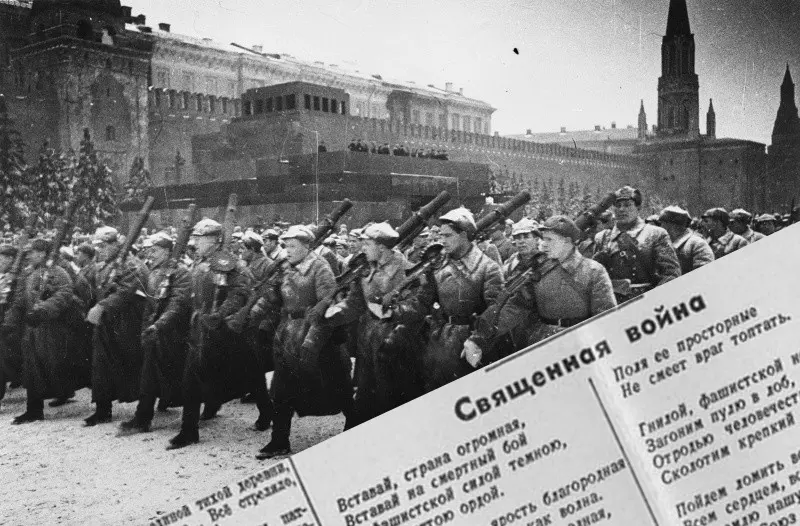According to widespread information, the real author of the words of the legendary song of the Great Patriotic War was in 1916 the provincial teacher Alexander Bode, who dedicated his poem to the war that was more relevant at that time. We checked to see if this was the case.
According to many sources, the immortal creation of the poet Lebedev-Kumach and composer Alexandrov was a remake of another work authored by a modest literature teacher from the city of Rybinsk. During the First World War, Alexander Bode wrote a poem that began with the lines:
"Get up, huge country,
Stand up for mortal combat
With German dark power,
With the Teutonic horde.
May the rage be noble
Boils like a wave
There is a people's war going on,
Holy War."
Many years later, in 1937, when the threat of a fascist invasion loomed over the country, Bode allegedly sent his little-known work to the eminent poet Vasily Lebedev-Kumach - it might come in handy, but he did not receive a response and died two years later. And after the start of the war, Lebedev-Kumach, making minor changes, passed off the poem as his own, written “in one night.” It was only in the 1980s that the truth began to surface.
Similar information can be found in the textbook. "History of Russia 1901–2001" for applicants to the Russian State University for the Humanities, magazine "New World" and another journalism 1990s, in the book of Nikolai Nepomniachtchi "Military mysteries of the Third Reich", an article entitled “Stolen song"in the military-historical magazine "Reitar" (No. 2, 2006). Director Stanislav Govorukhin briefly spoke about the case in his 1992 documentary "Russia that we lost". The main catalyst for the scandal is considered to be an article by Andrei Malgin "IN. I. Lebedev-Kumach. The most Soviet of poets", published in June 1991 in the then Soviet magazine “Capital”.
In his article, Malgin accused Lebedev-Kumach of plagiarism, citing a conversation with Bode’s daughter, Zinaida Kolesnikova, that took place in the mid-1980s. As it turned out, before that she wrote to Boris Alexandrov, the son of the composer of “The Holy War” (there was no answer), and had an intense correspondence with Literaturnaya Gazeta in 1981. In particular, according to Kolesnikova, the melody of the song was also born in her family - it was written by Zinaida’s mother, a musician by training.
When the Literary Gazette asked for evidence of Alexander Bode’s authorship (records of the text before 1941, a copy of the letter to Lebedev-Kumach), the elderly woman replied that she did not accuse the famous poet of plagiarism - in fact, he fulfilled her father’s request, making it the anthem of the future war, and even in the orchestration of Alexandrov, which Bode dreamed of. He burned all his papers before his death in 1939 in a painful attack, but Kolesnikova goes into some detail told about almost every quatrain of the original, in her words, creation - how and why it was written. We can conclude that Zinaida Alexandrovna simply wanted to restore historical justice.
Years have passed since then, Zinaida Kolesnikova was no longer alive (she died in 1988), and the events around the “Holy War” did not subside. After all, there was a second side - the heirs of Vasily Lebedev-Kumach. In particular, Maria Deeva, the poet’s granddaughter, began the struggle for the bright name of her grandfather even before Malgin’s publication. And in 1998, after the release of another revealing articles in Nezavisimaya Gazeta, Deeva filed a “claim to protect the honor and dignity of M. G. Deeva” in the Meshchansky Intermunicipal Court of Moscow. to A.V. Malgin, V.A. Shevchenko (author of the article) and Nezavisimaya Gazeta. Deeva later dropped all legal claims against Malgin, who at that time was the chairman of the board of directors of the Center Plus publishing house, which was under the patronage of Moscow Mayor Yuri Luzhkov. However, she achieved her main goal: the court ruled that the authorship of the lyrics of the song “Holy War” belongs to Lebedev-Kumach. Nezavisimaya Gazeta was forced to publish refutation.

In its verdict, the court relied on the lack of evidence on the one hand (the witness, the great-grandson of Alexander Bode, reported the loss of a notebook with poems in pre-revolutionary spelling and a receipt confirming the receipt of the letter by Lebedev-Kumach) and the presence of such on the other (there were drafts of Lebedev’s text with edits). Great-grandson Bode had no claims to authorship before. It would seem that the issue should be closed forever.
However, there are a few things. This is, firstly, an expert conclusion Doctor of Art History, Professor of the History of Russian Music Evgeny Levashev, compiled at the request of Nezavisimaya Gazeta in 1999. Levashev not only defends Bode’s poetic authorship, expressing doubts about the impartiality and validity of the court’s decision, but also questions the authorship of the music. Using detailed historical and stylistic analysis, as well as referring to the testimony of members of the Bode family, he substantiates Bode's authorship of the original melody and assigns Alexandrov the role of a professional arranger. In particular, he notes that the court refused to allow the defendants to conduct an examination. In addition, Levashev, as an additional argument, cites other cases of Lebedev-Kumach borrowing the works of Russian poets. In addition, there are other reviews text and melody of “The Holy War” in Bode’s version and in Alexandrov’s version, from which we can conclude: not everything is clear in this case, and the court’s decision was not based on all available sources.

And although in some arguments Evgeny Levashev is found inaccuracies, the totality of available information allows us to say: today an unambiguous verdict in favor or against Bode’s authorship is possible only based on the results of new professional examinations.
This is not accurate
Read on topic:
1. Andrey Malgin. “V.I. Lebedev-Kumach. The most Soviet of poets."
2. “Zinaida Kolesnikova, née Bode. Correspondence with Literaturnaya Gazeta.
3. Andrey Chernov. “The Holy War” by Alexander Bode.
4. Evgeny Levashev. "The Fate of a Song".
If you find a spelling or grammatical error, please let us know by highlighting the error text and clicking Ctrl+Enter.







